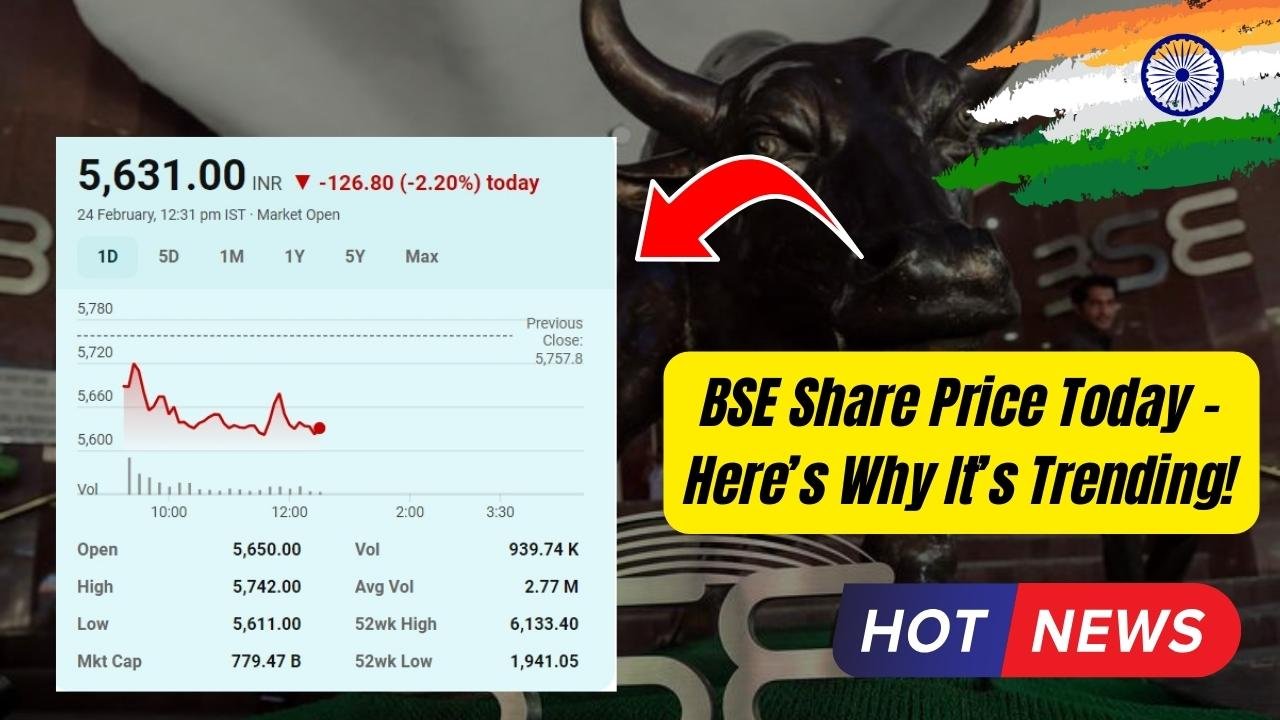Analysis of BSE’s share price, recent performance, and key influencing factors. Includes insights into financial performance, market trends, and future outlook.
The Bombay Stock Exchange (BSE), Asia’s oldest stock exchange established in 1875, plays a crucial role in India’s capital market. It facilitates trading in equities, currencies, derivatives, debt instruments, and mutual funds, serving over 6,000 companies. This article examines the recent performance of BSE’s share price, the factors influencing it, and provides an outlook based on available data.
Recent Performance
In a recent trading session, BSE Ltd’s share price closed at Rs. 5,745 per equity share, marking a 3.59 percent decrease from the previous closing price of Rs. 5,959.15. Over the past year, the stock has delivered a multi-bagger return of approximately 159 percent, although it has underperformed the Nifty Index during the same period.
Notably, during Q3FY25, BSE provided a positive return for Mukul Aggarwal’s portfolio, a period when the broader market experienced a downturn. The stock surged 22%, driven by strong third-quarter performance.
Investment by Goldman Sachs
A significant event was Goldman Sachs’ acquisition of a 0.54 percent stake in BSE for Rs. 401 crore on February 19, 2025, at a price of Rs. 5,786 per share. Such investments by prominent investment banks can boost investor confidence, reflecting a positive outlook on the exchange’s potential.
Factors Influencing BSE’s Share Price
Several factors can influence BSE’s share price, including:
- Market Sentiment: Bearish market sentiments and profit booking in mid- and small-cap stocks can lead to subdued business and potential downside in BSE’s earnings.
- Revenue Growth: Sequential data indicates slowing revenue growth, primarily due to reduced cash volume and lower treasury income.
- Regulatory Changes: Regulatory changes, such as the abolishment of weekly expiries, are expected to improve BSE’s Ebitda margin.
- Market Volatility: Increased market uncertainty could drive Foreign Institutional Investors (FIIs) towards derivative trading, a segment where BSE is performing well.
Financial Performance and Business Segments
BSE generates revenue from facilitating trading in securities and related ancillary services. Key revenue segments include:
- Transaction Charges (66.07 percent)
- Services to Corporations (19.39 percent)
- Treasury Income on Clearing and Settlement Funds (6.27 percent)
- Other Operating Revenue (data dissemination fee, trading income, software income, etc.) (8.27 percent)
In Q3FY25, BSE reported revenue from operations of Rs. 832 crore, a 95.30 percent increase year-on-year from Rs. 426 crore in Q3FY24. Net profit increased by 106.60 percent year-on-year, from Rs. 106 crores in Q3FY24 to Rs. 219 crores in Q3FY25. The Operating EBITDA margin, including & excluding Core SGF, is 31 and 56 percent, respectively. The Net Profit stood at 26 percent for December 2024.
Core Settlement Guarantee Fund (SGF)
The Core SGF is a fund mandated by SEBI for each recognized stock exchange to guarantee trade settlements. This fund is crucial in addressing trade shortfalls or defaults. In Q3FY25, the Core SGF contribution was Rs. 199 crore, with Rs. 147 crore paid by Indian Clearing Corporation Limited (ICCL) and Rs. 52 crore contributed by BSE.
Shareholding Pattern
As of December 2024, Foreign Institutional Investors (FII) held approximately 16.03 percent of BSE’s shares, Domestic Institutional Investors (DII) held 12.07 percent, and the Public held around 50 percent. Ace Investor Mukul Mahavir Agrawal held around 1.33 percent of the stake.
Broader Market Context
The BSE Sensex has experienced volatility, influenced by domestic and global economic trends. A significant decline of 4.93% saw the Sensex closing at a low of 5,216.95 after opening at 5,514.95. The index has fluctuated significantly over the past year, with a 52-week low of 1,941.05 and a high of 6,133.40.
Factors contributing to this decline include global economic trends, inflationary pressures in India, and monetary policy decisions by the Reserve Bank of India (RBI).
Conclusion
BSE’s share price is influenced by a combination of company-specific performance, market sentiment, regulatory factors, and broader economic trends. While the company has shown strong yearly performance, sequential slowing revenue growth and market volatility pose challenges. Investors should closely monitor these factors and consider consulting with financial advisors before making investment decisions.
Sources: https://www.livemint.com/market/stock-market-news/bse-stock-bse-shares-bse-q3-mukul-aggarwal-portfolio-bse-star-mf-midcaps-smallcaps-derivatives-trading-f-o-retail-11739949124130.html
https://localharyana.com/trending-news/bse-share-price-decline-of-4-93-on-february-27/
https://tradebrains.in/features/how-does-bse-make-most-of-its-money-and-is-it-a-never-ending-business/
